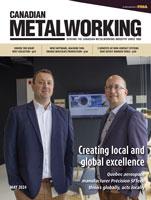Managing Director -- Metals
- FMA
- The Fabricator
- FABTECH
- Canadian Metalworking
An inside look at the metals marketplace
Sourcing metals requires understanding carbon taxes, environmental impact
- By Brian Collins
- December 27, 2018
The metals sector is experiencing more volatility, complexity, and uncertainty than ever before. While industry participants have always been subject to a certain degree of political, economic, regulatory, environmental, and technological change, the pace of change is increasing rapidly.
Today every member of the metal supply chain faces more stringent environmental and ethical scrutiny as low-carbon emission standards, production waste management regulations, and increasing demands for responsible sourcing are all pressuring market participants and threatening margins. With imminent changes in supply chains and shifts in cost structures looming, the question remains: Are businesses in this supply chain equipped with the right tools to handle these changes effectively and mitigate new risks that emerge?
Low-carbon economy initiatives create risk
Despite market investments in renewable energy to power mining and production, the metals industry still is primarily driven by traditional energy sources that emit a substantial amount of carbon. Aluminum production, for example, is responsible for 1 per cent of global CO2 emissions and has a carbon intensity of 1tCO2/t to 20tCO2/t. Steel production also has a high carbon intensity, averaging 1.9tCO2/t, depending on the production path.
The metals value chain remains a primary target for environmental regulators and policy-makers looking to reduce greenhouse gas emissions. An initiative that has taken flight in recent years is carbon pricing, either through an emissions trading scheme (ETS) or in the form of carbon taxes.
According to World Bank, 42 countries and more than 25 subnational jurisdictions already have deployed some form of carbon pricing. While carbon pricing covers only about 15 per cent of all global emissions, it will likely increase as major mining countries like Canada plan to implement carbon pricing systems.
As the concept of carbon pricing continues to spread – particularly given the attractive revenue-generating opportunities and reputational enhancements it offers to local and national authorities – more metals and mining firms will be exposed to this particular form of regulatory risk, as well as the financial penalties and drops in shareholder value that come with compliance breaches.
As more metals and mining businesses come under the auspices of external pricing or, indeed, adopt their own internal pricing mechanisms, they will need the ability to track prices effectively, hedge their exposures, and calculate the true financial impact of any operational trade-offs. Without this capacity, businesses will find their quarterly earnings become more erratic, accounting becomes more complex, and stakeholder value becomes less predictable.
Waste management concerns threaten margins
Carbon isn’t the only waste product under environmental scrutiny. Toxic waste generated at each stage of the production process outweighs total metal extraction by four times. In an effort to reverse the waste’s negative impact on the environment, policy-makers are tightening standards and regulations.
In decades past, the metals industry was able to circumvent environmental legislation by moving mining operations or refining facilities to emerging economies with lower regulation standards. However, the resulting increase in waste material has amplified the pressure from government bodies around the world to develop appropriate mitigation strategies. As a result, operational costs have also increased, and will continue to do so as more areas reject all but strictly monitored, managed, and audited waste-management procedures.
Need for traceability cannot be overstated
Increasingly, customers and end consumers are demanding assurance that each stage of a supply chain meets environmental and ethical standards. At the same time, unknown geopolitical factors that can inhibit trade at a moment’s notice create a different kind of challenge for international metals businesses.
In this type of market, regulatory arbitrage is much more difficult to achieve. The consequences of compliance breaches have a longer-term impact than share-price volatility, and metals businesses will have to remain innovative, and establish greater internal controls, to stay on the right side of both the law and public opinion.
To effectively meet traceability standards, market participants must have the tools necessary for real-time portfolio management and reporting to ensure that responsible sourcing is taking place and to provide proof to the competent authorities.
Today metal production and mining companies use enterprise commodity management software to effectively mitigate risk and navigate regulatory requirements.
Traditionally, the metals market has been underserved when it comes to the availability of such systems. Even when commodity trading and risk management (CTRM) software with the necessary functionality to manage regulatory risk is in place, it has often fallen short on the functionality specifically designed for metals. Homegrown commodity management systems and manual tools, such as spreadsheets, are even more unsatisfactory, because they are resource-consuming and expose businesses to greater risk.
The future success of metals and mining businesses will depend on having real-time visibility and full value-chain control across front, middle, and back offices. Industry participants need a means that can be easily adapted to individual processes and prepare them for industry changes and business growth.
In that light, CTRM software, such as Allegro Horizon, developed by and for the metals industry, is expected to be considered increasingly as a critical success factor. With this type of system, businesses can efficiently manage emissions pricing, regulatory risk, and traceability – no matter how volatile the market becomes.
The future for the metals industry will be both exciting and challenging. Having the best technology platforms could very well determine which businesses survive and thrive despite market uncertainty.
Brian Collins is managing director, metals for Allegro Development, www.allegrodev.com.
subscribe now


Keep up to date with the latest news, events, and technology for all things metal from our pair of monthly magazines written specifically for Canadian manufacturers!
Start Your Free SubscriptionAbout the Author
- Industry Events
Automate 2024
- May 6 - 9, 2024
- Chicago, IL
ANCA Open House
- May 7 - 8, 2024
- Wixom, MI
17th annual Joint Open House
- May 8 - 9, 2024
- Oakville and Mississauga, ON Canada
MME Saskatoon
- May 28, 2024
- Saskatoon, SK Canada
CME's Health & Safety Symposium for Manufacturers
- May 29, 2024
- Mississauga, ON Canada





















